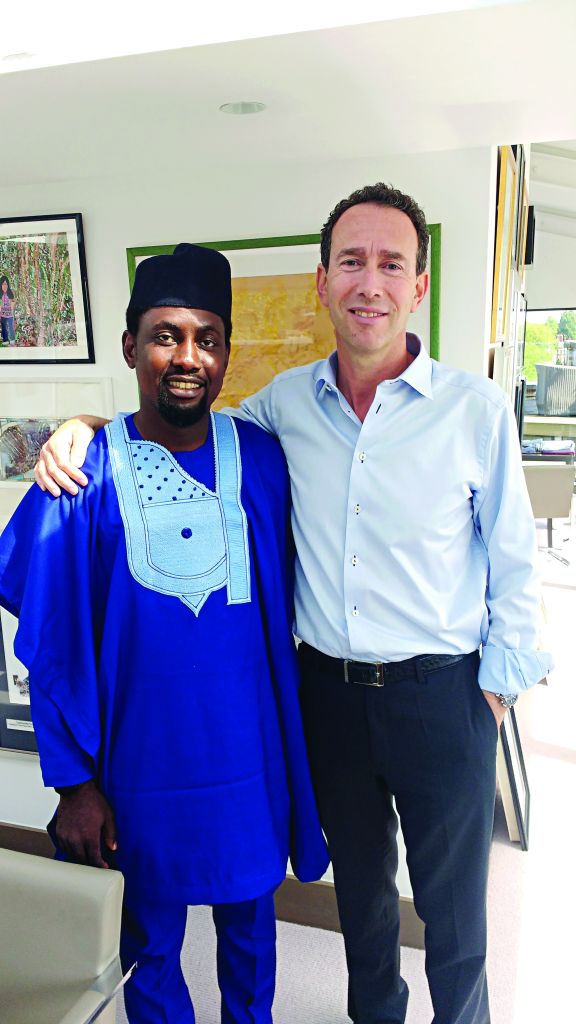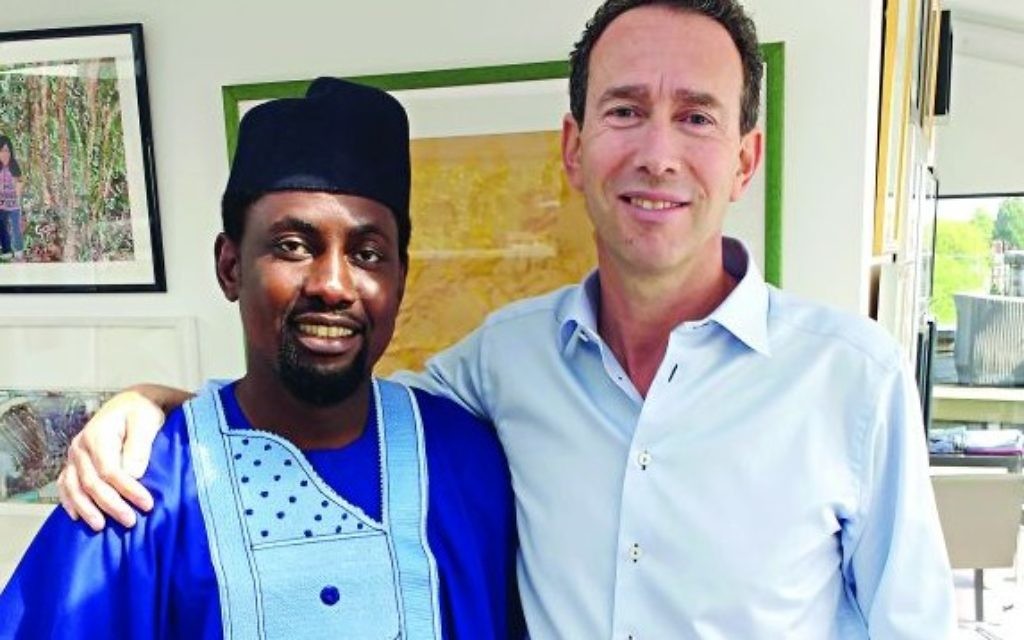Jewish News meets Trevor Pears: ‘I get immense pleasure in helping people help others’
Trevor Pears tells Stephen Oryszczuk how his identities both as a Jew and as a global citizen have shaped his philanthropy
Nigerian doctor Rilwan Raji is back working in his country’s north. He is trying to eradicate polio, measles, meningitis, Lassa fever and Ebola from refugee camps near areas controlled by Boko Haram. This group of Islamist terrorists, who abducted hundreds of schoolgirls in 2014, abhor all things Western, including vaccinations. As a result, outbreaks are occurring, says Raji. The problems, in short, are many.
But the doctor is now better prepared to deal with them after having spent a year in Israel studying for his International Masters in Public Health, on a scholarship paid for by Trevor Pears and his two brothers.
Raji studied in Jerusalem, at Hebrew University, where he was part of a cohort comprising 19 nationalities, including three Palestinians.
Get The Jewish News Daily Edition by email and never miss our top stories Free Sign Up
Meeting last month in Pears’ office in Hampstead, north-west London, Raji describes having spoken to 245 Jewish children at JFS earlier in the day (“they wanted to know about my clothes and where they could get them”). He told them about the scholarship and the work he’s doing. Imagine you’re a footballer, he says, and you can’t use your legs. That’s what polio does. The hall falls silent.
Meeting alumni brings home to Pears what his family’s money is doing. “Looking at your face, it is unbelievably rewarding,” he tells Raji. “Among all the programmes we support, this is the one we wouldn’t drop. Meeting people like Rilwan, having the opportunity to help them a bit on their journey, it gets you out of bed in the morning.”
The Pears Foundation is well known in the Jewish community for its philanthropy, but Pears himself keeps a low profile – this is his first interview in ten years. “People in philanthropy talk about impact, and measuring impact, and here we are sat opposite somebody who is impacting tens if not hundreds of thousands of people,” he says. “If you can be a small part of that journey – wow.”
Isn’t he the reason for the journey? “No, they’re the reason for the journey. If Rilwan didn’t exist, we couldn’t help him. If Hebrew University didn’t have this public health course or others covering animal, plant and nutritional science, we couldn’t help. Strangely, very few people in British Jewry – or in Israel for that matter – actually know about these programmes.”
He’s right. Israel has a history of reaching out to developing countries, particularly in Africa, but Israel’s Mashav – the equivalent of Britain’s Department for International Development (DfID) – is little known among Israelis. It’s good work, done quietly.
“It’s been quiet because the focus and noise is elsewhere,” says Pears. “You don’t shout about these things. We believe in it, as British Jews. These are core central Jewish values. But Israel has been engaged in this since day one, which is remarkable. What you do is who you are. At the heart of Israel, at the heart of being Jewish, is welcoming the stranger, working with others. You talk about Maimonides’ highest form of giving, helping people help themselves. In this case we’re helping people help themselves, who then go on to help countless others. It’s phenomenal.”
He turns back to Raji. “I can’t help it. At the same time as you’re talking about these deeply troubling and challenging issues, the pleasure I get from listening to you is immense. It’s a funny thing, that.”
Pears knows that the world offers plenty of challenges – he was in Ghana last year, supporting a project to reduce child mortality – and travels a lot. But what comes across in our interview is that he genuinely, passionately cares. He’s a stayer, too: the Pears family has backed this programme for 17 years, and it currently supports 30 scholars from developing countries. Many go on to attain senior positions: among alumni is a former Kenyan ambassador to the UN. Pears hasn’t met them all, but you get the clear impression he’d love to.
They are an international group – West African, Colombian, Nepalese, Ukrainian and many others (they’ve all shared Raji’s photo with the Israeli ambassador on WhatsApp). All have their own country-specific issues. For Raji, eradicating polio from Nigeria is the big one. “For me, it’s personal,” he says.
It’s personal to Pears, too. How does he choose which requests to back? “We set our own direction, which makes it easier to say no.” How does he set it? There’s a joke, he says, that once you’ve met one family foundation, you’ve met one family foundation – in other words, they’re all idiosyncratic by nature.

Describing his voyage into philanthropy, he says: “At first it was like getting in a boat, putting up the sail, and off I went, going where the wind blew me. I didn’t put a rudder in for quite a long time… With hindsight, I think that was a good way to go, and it suited my personality.
“I’m a bit like a butterfly, going from one to the next. I won’t narrow it down to say ‘We only do this or that.’ We support a good range of what we think are interconnected good causes. But it’s less about the cause than it is the people. Rilwan is the perfect example. It’s in them that we invest.”
Are there funding decisions he regrets? Not really, but some have gone better than others. “We’ve learnt a lot along the way. Even things that didn’t go as well as we’d hoped have led on to other opportunities. For example, the Give More intervention led to partnership with the Royal Free, encouraging young people to volunteer in hospitals. Another is the Chief Rabbi’s initiative taking young British Jews to Mumbai. It’s having the opportunity.”
It feeds into his journey of the past 20 years, and goes to who he is. “We all have multiple identities – we’re many things – and one is my Jewish identity. We were drawn to international development as global citizens, but I felt quite lonely in that space, as the only Jew.
“After two or three years and several meetings, however, some of the people I got to know would quietly say to me ‘By the way, I didn’t tell you before, but I’m Jewish too.’ These people were doing this stuff not because they were Jewish, but despite being Jewish. They felt they had to give something up to do it because it wasn’t seen as something Jews did. It was very odd to see.”
It’s fascinating how Pears saw his philanthropy as part of his Jewish identity, whereas other philanthropic Jews saw the two aspects as separate, though he says that is changing.
He is still sometimes asked what percentage of his funding goes to Jewish causes, he adds. “My answer to that is ‘every penny’, because that’s how we see the world. Some people still think ‘you’re Jewish so you should support that’, or ‘you’re British so you should support this’. I don’t see it like that. We’re all these things, and they complement each other.”

Thank you for helping to make Jewish News the leading source of news and opinion for the UK Jewish community. Today we're asking for your invaluable help to continue putting our community first in everything we do.
For as little as £5 a month you can help sustain the vital work we do in celebrating and standing up for Jewish life in Britain.
Jewish News holds our community together and keeps us connected. Like a synagogue, it’s where people turn to feel part of something bigger. It also proudly shows the rest of Britain the vibrancy and rich culture of modern Jewish life.
You can make a quick and easy one-off or monthly contribution of £5, £10, £20 or any other sum you’re comfortable with.
100% of your donation will help us continue celebrating our community, in all its dynamic diversity...
Engaging
Being a community platform means so much more than producing a newspaper and website. One of our proudest roles is media partnering with our invaluable charities to amplify the outstanding work they do to help us all.
Celebrating
There’s no shortage of oys in the world but Jewish News takes every opportunity to celebrate the joys too, through projects like Night of Heroes, 40 Under 40 and other compelling countdowns that make the community kvell with pride.
Pioneering
In the first collaboration between media outlets from different faiths, Jewish News worked with British Muslim TV and Church Times to produce a list of young activists leading the way on interfaith understanding.
Campaigning
Royal Mail issued a stamp honouring Holocaust hero Sir Nicholas Winton after a Jewish News campaign attracted more than 100,000 backers. Jewish Newsalso produces special editions of the paper highlighting pressing issues including mental health and Holocaust remembrance.
Easy access
In an age when news is readily accessible, Jewish News provides high-quality content free online and offline, removing any financial barriers to connecting people.
Voice of our community to wider society
The Jewish News team regularly appears on TV, radio and on the pages of the national press to comment on stories about the Jewish community. Easy access to the paper on the streets of London also means Jewish News provides an invaluable window into the community for the country at large.
We hope you agree all this is worth preserving.
-
By Laurent Vaughan - Senior Associate (Bishop & Sewell Solicitors)
-
By Laurent Vaughan - Senior Associate (Bishop & Sewell Solicitors)
-
By Laurent Vaughan - Senior Associate (Bishop & Sewell Solicitors)
-
By Laurent Vaughan - Senior Associate (Bishop & Sewell Solicitors)






















